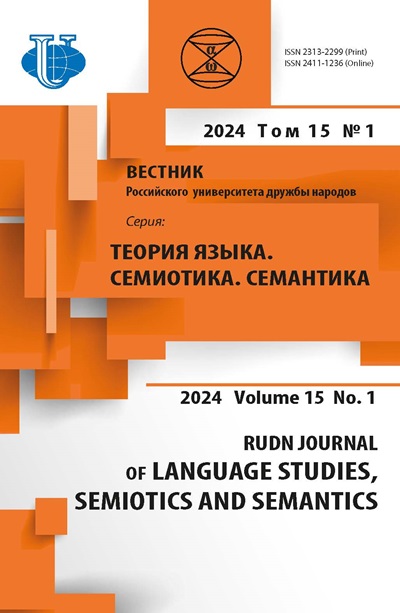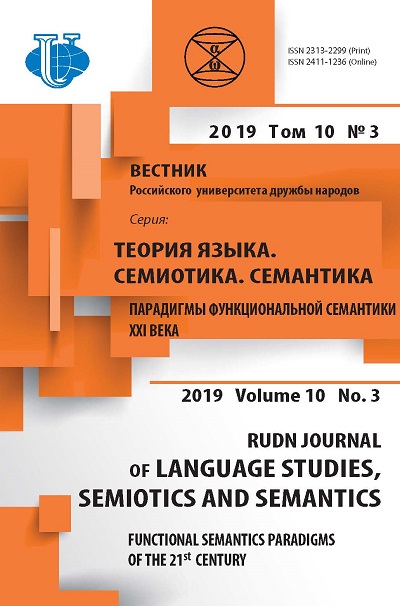Philosophical Issues of Semantics Raised by L.A. Novikov as a Key to Creating the Terminology Apparatus of Legal Linguistics (Category of Intentiuon)
- Authors: Maslova V.A1, Lavitski A.A1
-
Affiliations:
- Vitebsk State P.M. Masherov University
- Issue: Vol 10, No 3 (2019): Functional Semantics Paradigms of the 21st century
- Pages: 567-580
- Section: METHODOLOGY AND METHODS OF FUNCTIONAL SEMANTICS AND LINGUOSEMIOTICS
- URL: https://journals.rudn.ru/semiotics-semantics/article/view/22115
- DOI: https://doi.org/10.22363/2313-2299-2019-10-3-567-580
Cite item
Full Text
Abstract
In the late 20th century, in linguistics, inevitable changes were felt which were connected with the necessity in the transition of the science about language onto an absolutely new stage of its development. L.A. Novikov was one of the first among those who understood it. In the 80-s of the previous century he presented a new idea of semantics with deep philosophic understanding of its problem field, with the aspiration to seek solutions through the language interdisciplinary links. For the contemporary linguistics L.A. Novikov’s approaches are evident; however, they are not deprived of urgency and can become a clue to the solution of many problems especially in the field of terminology studies. In the present paper, on the basis of L.A. Novikov’s theory, an attempt is made to give the definition for the category of intentionality from the point of view of legal linguistics since the application of the available in the theory of law ideas for the new integrated direction is already insufficient. Legal linguistics has entered the development phase when there is an urgent necessity in shaping its own terminological vocabulary. This process can’t be “closed” and be limited by the approaches of the theory of law and theory of language: the shaping of the notion apparatus must be based on the ideas available in philosophy, psychology, physiology, education etc. This understanding of the problem finds its reflection in the present paper which makes it possible to define intentionality as a form of the implementation of the deliberateness of the act which is determined by the motive.
About the authors
Valentina A Maslova
Vitebsk State P.M. Masherov University
Author for correspondence.
Email: mvavit@tut.by
Dr. habil., Professor, Professor of the Department of Germanic philology
Vitebsk, BelarusAnton A Lavitski
Vitebsk State P.M. Masherov University
Email: anton_lavitski@mail.ru
Head of the Department, PhD (Philology), assistant professor
Vitebsk, BelarusReferences
- Novikov, L.A. (1982). The semantics of the Russian language. Moscow: Higher School. (In Russ.).
- Novikov, L.A. (2011). Selected Works. Volume I. Problems of linguistic significance. Moscow: Publishing house of RUDN. (In Russ.).
- Maslova, V.A. (2018). Modern trends in linguistics. Vitebsk: VSU named after PM. Masherova. (In Russ.).
- Lebedeva, N.B. (2000). On the metalinguistic consciousness of lawyers and the subject of legal science. Legal studies — 2: a collection of scientific papers. Barnaul: Publishing House of the Altai University. pp. 49—67. (In Russ.).
- Golev, N.D. & Matveeva, O.N. (2006). Linguistic expertise: at the crossroads of language and law. Legal studies—7: language as a phenomenon of legal culture. Barnaul: Publishing House of Altai University. pp. 189—210. (In Russ.).
- Kashanina, T.V. (2004). The origin of the state and law. Moscow: Higher School. (In Russ.).
- Katkov, V.D. (1901). Science and philosophy of law. Berlin: Publishing of the Stuhr bookstore. (In Russ.).
- Titov, V.D. & Zarkhina, S.E. (2009). The historical development of philosophical and logical concepts of the language of law. Moscow: FINN. (In Russ.).
- Otto, W. (1982). Erwartungen an die Rechts — und Verwaltungssprache in der Zukunft. Muttersprache. Heft 5-6/92. Wiesbaden: GfdS. pp. 309—316. (In German).
- Podlech, А. (1976). Rechtslinguistik. Grimm, Dieter [Hrsg.] Rechtswissenschaft und Nachbarwissenschaften. Bd. II. München: Beck. ss. 105—116. (In Ger.).
- Brinev, K.I. (2009). Theoretical linguistics and judicial linguistic expertology. Barnaul: AltGPA. (In Russ.).
- Aleksandrov, A.S. (2003). Introduction to forensic linguistics. N. Novgorod: Nizhny Novgorod Academy of Law. (In Russ.).
- Arutyunova, N.D. (1988). Types of language values. Evaluation. Event. Fact. Moscow: Nauka. (In Russ.).
- Golev, N.D. (2003). The interaction of natural and legal language as a basic problem of legal science. Pravo i lingvistika. Simferopol: SHARE. рp. 33—41. (In Russ.).
- Osadchy, M.A. (2016). Russian language on the verge of law: the functioning of the modern Russian language in terms of the legal regulation of speech. Moscow: Book house “LIBRIKOM”. (In Russ.).
- Osadchy, M.A. (2012). Forensic linguistic parametrization of the verbal threat. Modern problems of science and education. no. 6. pp. 498—507.
- Golev, N.D. Legal studies: a course program for students of the Faculty of Philology, studying for an additional specialization “Linguocriminalism”. URL: https://cyberleninka.ru/article/n/ yurislingvistika-programma-kursa-dlya-studentov-filologicheskogo-fakulteta-obuchayuschihsya-po-dopolnitelnoy-spetsializatsii (accessed: 01.06.2019). (In Russ.).
- Baevsky, V.S. (2001). Linguistic, mathematical, semiotic and computer models in history and literary theory. Moscow: Languages of Slavic culture. (In Russ.).
- Bakhtikereva, U.M. (2015). Georgy Dmitrievich Gachev's Phenomenon. National World Images in Artistic Culture. Nalchik: Izd-vo M. and V. Kotlyarovyh. рр. 10—15. (In Russ.).
- Chernigovskaya, T.V. (2017). Schrodinger's Cheshire Smile: Language and Consciousness. Moscow: Languages of Slavic culture. (In Russ.).
- Novikov, L.A. (1966). Logical contrast and lexical antonymy. Russian language at school. no. 4. pp. 79—87. (In Russ.).
- Grice, P. (1989). Studies in the Way of Words. Cambridge, Mass: Harvard University Press. (In Eng.).
- Strawson, P.F. (1970). Meaning and Truth. Philosophy as it is. London: Oxford University Press. (In Eng.).
- Searle, J. (1983). Intentionality: An Essay in the Philosophy of Mind. Cambridge: Cambridge University Press. (In Eng.).
- Stepanov, Yu.S. (2007). Concepts. Thin film of civilization. Moscow: Languages of Slavic culture. (In Russ.).
- Stepanov, Yu.S. (2010). Thinking cane. The book about the “imaginary” literature. Kaluga: Eidos Publishing House. (In Russ.).
- Stepanov, Yu.S. (2004). Proteus. Essays on chaotic evolution. Moscow: Languages of Slavic culture. (In Russ.).
- Berestnev, G.I. (2017). Synchronicity as an object of cognitive linguistics. Spirituality and mentality: the ecology of language and culture at the turn of the XX—XXI centuries. Part 1. Lipetsk. рp. 36—44. (In Russ.).
- Rikor, P. (2002). Conflict of interpretations. Essays on hermeneutics. Moscow: CANON-press-C; Kuchkovo Pole. (In Russ.).
- Kolesov, V.V. (1999). Life comes from the word.. SPb: Zlatoust. (In Russ.).
- Sukharev, A.Y. & Krutskikh, V.E. (2003). Large legal dictionary. Moscow: Infra-M. (In Russ.).
- Malko, A.V. (2009). Large legal dictionary. Moscow: Prospectus. (In Russ.).
- Efremova, T.F. (2000). New dictionary of the Russian language. Sensible word-building. Moscow: Russian language. (In Russ.).
- Merriam-Webster’s Dictionary of Law (2016). Merriam-Webster: Merriam-Webster Incorporated. (In Eng.).
- Dictionary of Synonyms (V.N. Trishin, 2013).URL: http://rus-yaz.niv.ru/doc/synonyms-trishin/ index.htm. (accessed: 01.06.2019). (In Russ.).
- Novikov, A.M. (2013). Encyclopedic dictionary on psychology and pedagogy. Moscow: IET Publishing Center. (In Russ.).
- Hegel, G. (2009). Philosophy of Law. Moscow: Mir of the book. (In Russ.).
- Concise Encyclopedia of Psychology. URL: http://publ.lib.ru/ARCHIVES/K/KORSINI_ Raymond,_AUERBAH_Alan/_Korsini_R.,_Auerbah_A.html (accessed: 06/01/2019). (In Eng.).
- Lem, S. (1968). The amount of technology. Moscow: Mir publishing house. (In Russ.).













